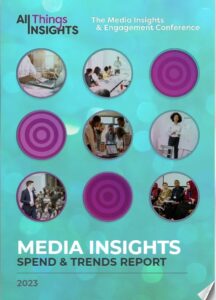The Blurring of Media Experiences
The future of media is likely one that is not just about content consumption but rather content experiences. Digital media will be the avenue for entertainment, news and business but there is more blurring of the lines in terms of branding, advertising, and traditional media channels. Consumers are becoming creators too, for example. There will be opportunities and drawbacks, certainly, but mediums like streaming media, social media and social gaming are continuing to reshape the landscape and enable new business models.
According to Bain & Company’s “Six Shifts Changing the Future of Media,” there are several trends to identify as companies strive to meet the new media and entertainment consumer.
- Omnipresent delivery: In addition to demanding the content they want, where they want it, and when they want it, consumers also expect that content to be interconnected. That’s where we start to see cohesion become critical across media platforms, and media start to blend into other sectors, such as retail.
- My media: Everything is about the individual consumer and his or her niche communities. Companies that can use data to personalize and customize their content and delivery will win hearts and minds (and money). Delivering communities will become increasingly important.
- Global aperture: Borders are disappearing. Content exposure increases, global connections increase, and a demand for authenticity and an understanding of the diverse world we live in increases. A more interconnected world means the ability to reach niche audiences with locally tailored content—and the ability to hold the media accountable for diverse, global representation.
- Consumer producers: Look for more democratized platforms. Not only are individual creators leveraging increasingly professional tools and easy uploads to pour passion into platforms they’ve never had access to before, but established content also lives on. Creators can edit, remix, and mash content, post it on social feeds, and watch it evolve as other producers put their own spin on it for the world to consume.
- Emerging metaverse: The idea of living in a metaverse has only increased as commerce, culture, and multiplayer role-playing games have converged in virtual worlds. As virtual worlds have developed, they have incorporated concerts, shopping, and other experiences that were once thought of as only physical. These worlds create alternate lives for their users, and the idea of alternate virtual environments will slowly infuse daily life beyond gamers.
- Beyond reality: Augmented reality (AR), in particular, supported by AI, is likely to be more transformative than virtual reality (VR) in the near-term, given the ability to seamlessly layer AR on top of our daily life. The next wave of technology will expand the potential for human-machine interactions, blending on-screen experiences with our physical world.
Staying on Course in a New Media World
All Things Insights dove deeper into media insights with “Adapting to Disruption while Moving Media Insights Forward.” Last year, the first Media Insights Perspectives Report was released. Brought to you by All Things Insights and the Media Insights & Engagement Conference, this report showcased how insights, analytics and research leaders are changing mindsets, shifting priorities and strategies as they balance their research efforts with the latest technological developments, such as AI.
Looking forward to The Media Insights & Engagement Conference? It will be held February 3-5, 2025, at The Scott Resort & Spa, Scottsdale, AZ. The opening keynote, “Charting the Course of Media’s Next Wave,” will be presented by Ricky Strauss, former President, Content & Marketing, Disney+. Embark on a journey through the dynamic world of media with Strauss, a 36-year veteran entertainment executive renowned for his leadership in global marketing strategies across major platforms. From his pivotal roles at Apple TV+, Hulu, Disney +, and beyond, Strauss has shaped the landscape of modern storytelling and audience engagement. Join us as he shares insights into his remarkable career—how he constantly reinvented himself, forged deep connections with audiences, and navigated the highs and lows of the industry. Discover first-hand the strategies that drove the success of iconic titles like “Star Wars: The Force Awakens,” “Frozen,” “The Avengers,” and “Finding Dory” and gain exclusive perspectives on where media is headed next.
Register for the Media Insights & Engagement Conference
A Media Evolution
As we navigate this dynamic environment, it’s crucial to understand the major trends shaping the future of media. We asked Gemini to identify some of the key trends in media’s evolution.
- AI and Automation:
- Personalized Content: AI algorithms can curate content tailored to individual preferences, enhancing user engagement and satisfaction.
- Automated Journalism: AI-powered tools can generate news articles, freeing up journalists to focus on more in-depth investigations.
- Immersive Experiences:
- Virtual and Augmented Reality: These technologies offer immersive experiences, blurring the lines between the real and virtual worlds.
- 360-Degree Video and Audio: Providing users with a more immersive and engaging way to consume content.
- Social Media Evolution:
- Decentralized Platforms: A shift towards decentralized social media platforms could give users more control over their data and content.
- Short-Form Video: Platforms like TikTok and Instagram Reels have popularized short-form video content, changing the way we consume information.
- Subscription Models:
- Direct-to-Consumer (D2C) Services: Streaming platforms like Netflix and Disney+ have disrupted traditional media distribution.
- Bundled Subscriptions: As the number of subscription services grows, there may be a trend towards bundled offerings.
- Ethical Considerations:
- Fake News and Misinformation: Addressing the challenges of fake news and misinformation will be a critical issue.
- Data Privacy: Protecting user privacy while leveraging data for personalization will be a balancing act.
The Digital Divide & Beyond
Of course, these trends may pose significant risks (and rewards) to media companies that are looking beyond and into the future of media. The transition to new media models may pose economic challenges for traditional media companies. Ensuring equitable access to technology and media will be essential to prevent a digital divide. The rapid pace of change may impact job roles within the media industry. Finally, embracing innovation will be crucial for media organizations to stay relevant.
Bain & Company points to investment as one factor that can signal whether media companies are truly reshaping their offerings for the future. Some of the trends it identified, such as omnipresent delivery and content creators, are already here, while the metaverse stills seems a ways off. That being said, as Bain notes, “Whether you’re a media executive, an investor, or an increasingly involved consumer, think about how these trends affect you. Those who understand how these shifts could reshape markets and open new opportunities will gain a competitive edge, while those who sit comfortably on traditional business rhythms will scramble to catch up.”
Video courtesy of Milken Institute
Contributor
-

Matthew Kramer is the Digital Editor for All Things Insights & All Things Innovation. He has over 20 years of experience working in publishing and media companies, on a variety of business-to-business publications, websites and trade shows.
View all posts














































































